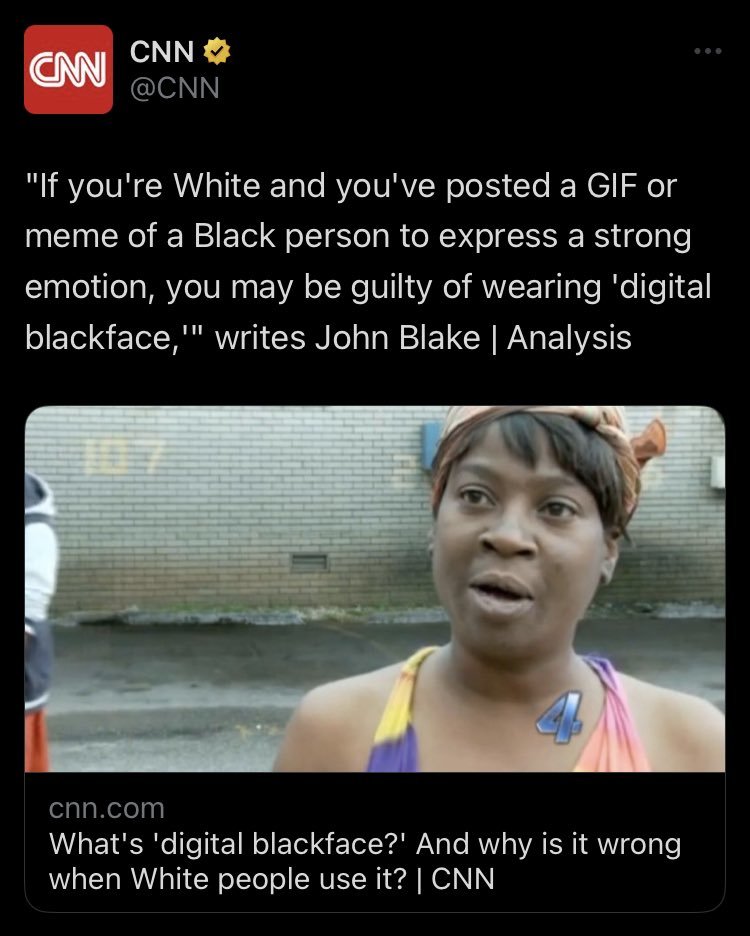Digital Blackface
Confirmed 29,504
Part of a series on Internet Slang. [View Related Entries]
Digital Blackface
Part of a series on Internet Slang. [View Related Entries]
About
Digital Blackface is a term used online that refers to the use of emojis, AAVE, animated GIFs, memes or other digital media featuring Black people by non-Black internet posters. While initially appearing in the mid-2000s, the term only became widespread online around 2017 when viral debates erupted following numerous media outlets covering the controversial concept.
Origin
On August 6th, 2006, a paper titled "Digital Blackface: The Repackaging of the Black Masculine Image" by author Joshua Green was published on the academic library OhioLink.[5] In the paper, the author investigates "new gaming technologies" and the impact the video game Grand Theft Auto: San Andreas "has on the player's perception of black masculinity."
Spread
On April 20th, 2016, the pop culture news site Variety[4] reported that a Bob Marley-themed Snapchat filter was being "called out as 'digital blackface'."
On April 26th, The Huffington Post[3] published an article titled "The Top 3 Types of Digital Blackface," which referred to the use of face swap software as a type of digital blackface.
On August 2nd, 2017, Teen Vogue[1] published an article titled "We Need to Talk About Digital Blackface in Reaction GIFs."
On August 15th, BBC News released a video titled "Is it OK to use black emojis and gifs?", which defined digital blackface as "white people using GIFs to perform some kind of exaggerated blackness" (shown below).
On September 4th, h3h3productions uploaded a video titled "BBC Introduces 'Digital Blackface'," which mocked the premise of the BBC broadcast, arguing that it promoted a type of racial segregation online (shown below, left). Within six months, the video accumulated more than 5.4 million views and 34,800 comments. On September 7th, YouTuber Dolan Darker uploaded a parody remix of the BBC segment on digital blackface (shown below, right).
On September 12th, Urban Dictionary[2] user H3H3Missionary submitted an entry for the term along with an animated GIF of h3h3productions host Ethan Klein reeling and captioned with the word triggered. On November 28th, 2017, The New York Times released an episode of the web series Internetting with Amanda Hess titled "The White Internet's Love Affair With Digital Blackface."
On March 26th, 2018, Andy Baio posted a series of tweets in which he criticized dubbing a video of a black cheerleader with "an all-white rock band" and urged white followers to stop posting "GIFs/videos of black women for your own self-expression" (shown below).[6]

2023 CNN Article
On March 26th, 2023, CNN published an article rehashing the Digital Blackface arguments from years prior.[7] In response, many commenters expressed their exhaustion with the concept. Several Black people opined that "Digital Blackface" is defined by non-Black people creating a Black online persona, not using Black people in GIFs or memes.

Search Interest
External References
[1] Teen Vogue – We Need to Talk About Digital Blackface in Reaction GIFs
[2] Urban Dictionary – digital black face
[3] The Huffington Post – Top 3 Types of Digital Blackface
[4] Variety – Snapchats Weed-Themed Bob Marley Filter Called Out as Digital Blackface
[5] OhioLink – Digital Blackface – The Repackaging of the Black Masculine Image
[6] Twitter – @waxpancake
[7] CNN – What’s ‘digital blackface?’ And why is it wrong when White people use it?
Recent Videos 4 total
Recent Images 5 total
Share Pin







